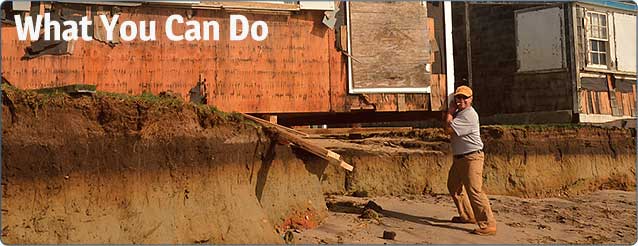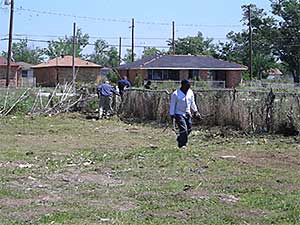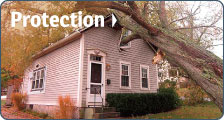
Photo Credit: RI Sea Grant
Taking Charge to Avoid the Angst of Change
Most Americans have stared at, purchased or even read a self-help book. We are the leading creators and users of self-help gurus.
Keep it simple! Organize your closet in 10 minutes a day! Handle a tough boss! Make money and friends! Wine is good for you ... uh, no, bad for you! It’s enough to make a well-intentioned perfectionist throw in that organic Egyptian cotton towel you cherish.
Know this: you need to prepare for more intense storms and sea level rise. You want to protect your property but discussions with your insurance agent leave your head spinning. Life is turning into one big set of fine print and you don’t have the patience, time or expertise to wade through all those clauses. The sky is falling or at least leaking. So what to do?
Well, the first step is to accept that none of our whining or railing against the climate gods will change the reality of the weather to come or the rising tides. So if we promise to avoid the lists — you know, Ten Ways to Be Climate Proof (which would be a big fat liar liar pants on fire) — how about you agree to consider some possible steps to protect yourself, your family, your neighbors, your community and the places you love.
Very simply, make sure you consider the grade around your house so water is encouraged to flow away from that foundation. Even build a rain garden with two jobs: to look beautiful and to absorb as much water as possible.
Duty done but your back hurts? It might just not fit the usual, “Sorry, honey, the trash has to wait. I’m busy saving our lives.” Teach it to your family just like the fire escape plan.
If you’re getting in a planning slump, turn your slump to sumps that pump. (No, we are not channeling Dr. Seuss). A sump pump will get all that rising basement water away from your house. But buy it now. Hint: bread and milk sells fast when there is a blizzard coming.
One more task — after all, it’s been five years since you started thinking about it. Time to clean those gutters as another way to move water away from the house.
Try a town meeting as a way to get leaders to get ready for changes in the climate. Right now, it doesn’t matter if you or they believe it is man-made or the result of beams from another galaxy. We’re talking reality and readiness. Insist on translation of that fine print and buy that flood insurance. Cool your house with natural ventilation, light-colored walls, and shuttered or shaded windows.

Residents of New Orleans cleaning absent neighbors' backyards following Hurricane Katrina.Photo Credit: J. Swift
But here’s the kicker: Despite the increase in intense storms, we can face water shortages. Why? Because the ground can’t absorb and store all that torrential rain. Asphalt aka impermeable surfaces send it into gutters and storm drains, and the water rushes off from the rivers to the sea. This leaves us with not enough water — a problem we can’t treat lightly. Consider: when you go on vacation, you can give your garden a good soaking but it’ll shrivel up and die all the same if there is no more water coming once evaporation has done its job in a few rainless days of relentless heat. Same with extreme rains followed by dry spells: feast to famine is less an idiom than a reality.
So plant drought-tolerant lawns, avoid the chemicals (nobody ever died from a dandelion), and relegate the sprinkler to the back of the shed. Faucets are not like the mythical stone soup that is never-ending; there has to be an untainted aquifer, reservoir or well to keep that H2O flowing.
Other steps to take? Maybe, just maybe, join a local board or environmental group that is involved with climate change issues. It’s not all tofu and talk. These folks care about the same things you do — a love of family, community and our Ocean State.
Let us not seek the Republican answer or the Democratic answer, but the right answer. Let us not seek to fix the blame for the past. Let us accept our own responsibility for the future.
- John F. Kennedy
You cannot escape the responsibility of tomorrow by evading it today.
- Abraham Lincoln
News
Factoids
There remains a significant gap between the percentage of people with an awareness of climate change and those taking action to solve the problem.
Planning ahead for winter storms, hurricanes, flooding, and other climate change related events can save you money and heartache.
The IRS offers tax breaks for damage to property from a sudden or unusual event. However, as we all know, the tax code is complicated so if you think you may qualify ask a tax professional. Then consider using the money you save on improvements to your home for the next storm.







